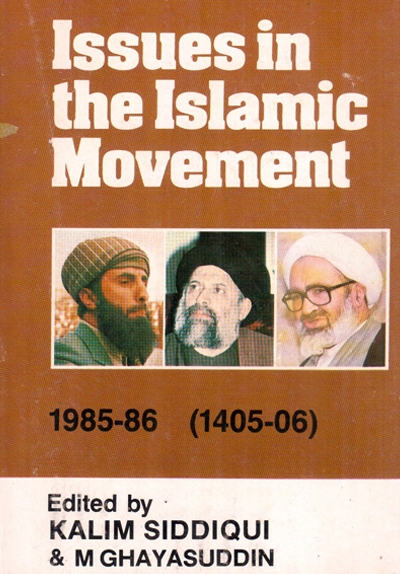Issues in the Islamic Movement 1985-86 (1405-06)

Author(s): Kalim Siddiqui
Publisher: The Open Press
Published on: Muharram, 1408 1987-09
ISBN: 0-905081-49-8, 0-905081-48-X (pbk.)
No. of Pages: 449
Foreword
by Kalim Siddiqui
In the foreword to the fifth volume of this annual anthology, I extolled the virtues of pure and simple description. The sixth volume now in your hands takes this process of description further than we have ever gone before. There is greater depth in analysis and in the selection of facts. Our writers are not afraid of expressing their views. Indeed, our work is subjective to its purpose.
The purpose has been to bring home to all doubters (of whom, sadly, there are far too many) that there is an integrated Ummah pulsating under the politically divided map that stares at us from the wall. Our purpose is also to prove, as if proof were needed, that this Ummah is a 'movement'. It is true that the only part of the global Islamic movement we can see above the surface, floating among the debris of recent 'Islamic parties', is small. It consists largely of those sturdy souls who have seen the possibilities inherent in the revolutionary process as revealed through the Islamic Revolution in Iran. The commitment of the people of Iran to Islam, and by inference to the global vision of Islam, is total. Its expression, as seen in the youthful idealism of the Basij (mobilization) force volunteers going to the war-front, is captivating. This idealism has also acquired a commitment to history expressed in blood. The blood of the shuhada, together with the powerful reverberations of the Islamic Revolution, will spill over into the neighbouring areas and hence to the Ummah as a whole. All 'national' and other boundaries in its path will be swept away. We may call this the process of the 'export' of the Islamic Revolution.
The conceptualization of the various processes and stages involved in reaching the climax of the Islamic Revolution has not even begun. This involves the extension of the study of the Qur'an into new areas. Such a process will also involve extending the study of the Seerah of the Prophet, upon whom be peace, with new insights gained from subsequent events. The entire 'political history' of the Ummah also needs a new framework for its proper understanding. The future in many ways is a reflection of the past. Though the past cannot be changed, it can be reinterpreted to meet the needs of the future we have to shape. Muslim political thought during the colonial period was little more than a jumble of confused thinking. I have made a concerted attack on it in the paper included as introduction to this volume. Equally it has to be admitted that the Islamic Revolution has yet to be consolidated into a revised paradigm of Muslim political thought. This can only be done when it is shown that the roots of the Islamic Revolution are deeply embedded in the Qur'an and in the Sunnah of the Prophet Muhammad, upon whom be peace, which are the commonly shared sources of political consciousness for all Muslims. Clearly the local Irani and Shi'i influences have also played a part. These influences in other parts of the Ummah can be replaced by other influences from within the recognized schools of thought in Islam. For the moment the Irani Sh'i'i influences on the Islamic Revolution are over-emphasised in Iran, as well as by opponents of the Islamic Revolution outside Iran. This is hampering the work of those of us who are engaged in globalizing the Islamic movement that is inspired by the Islamic Revolution in Iran. In time this will change insha' Allah.
However, every change needs a climate of opinion to accept and consolidate it when it occurs. This anthology and the media from which it is compiled have already created such a climate of opinion. in all parts of the world. Some groundwork, for the reformulation of Muslim political thought has also been undertaken at the Muslim Institute in London. The bulk of it has been done through the five world seminars held in London from 1982 to 1986. The Muslim Institute's perennial financial crises have forced us to suspend the seminar program for the time being. These will be resumed as soon as circumstances permit, insha' Allah. These annual anthologies represent at least a partial consolidation of the new ground that is covered by the Islamic movement.
Kalim Siddiqui
The Muslim Institute
6 Endsleigh Street
London WCIH ODS
April 29, 1987
Ramadhan 1, 1407
